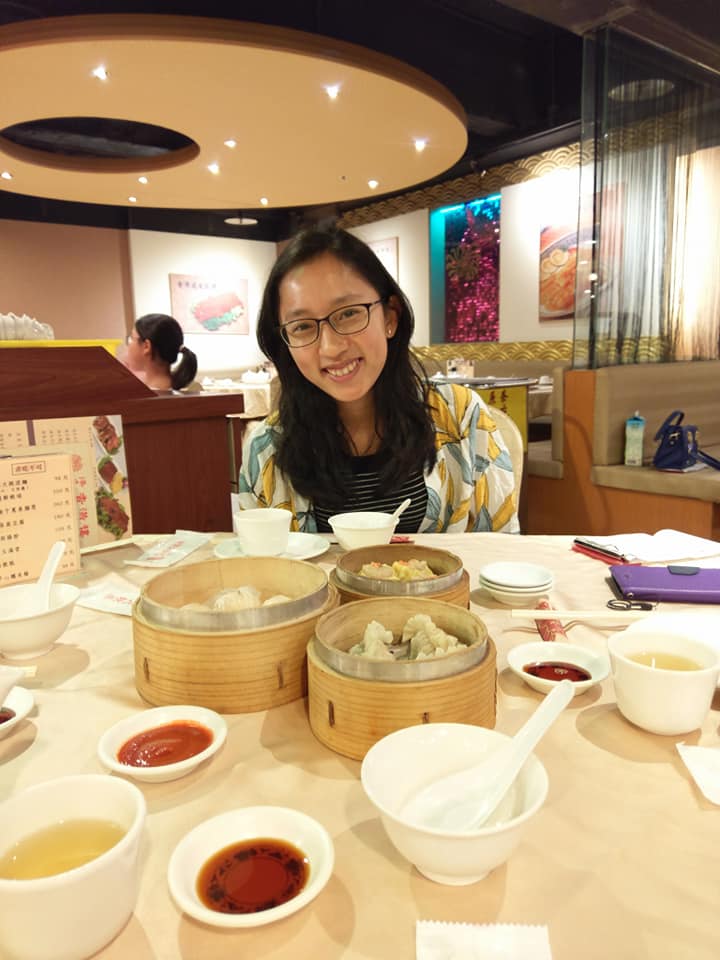I chose to do my four week elective in two fields of surgery at the National Taiwan University Hospital (NTUH) in Taipei, Taiwan. I spent my first two weeks in Plastic and Reconstructive Surgery and the remaining two weeks in Cardiothoracic Surgery. I decided to do my July elective abroad as I felt it would be valuable for me to experience what medicine was like in a developed country setting and how different it was from the South African health system.
Pre-departure:
I chose to conduct my four week medical elective in Plastics and Reconstructive Surgery and Cardiothoracic surgery; primarily because as an undergraduate student we are not clinically exposed to those modules and I felt like spending my elective on it would broaden my knowledge and understanding of those surgeries entailed. Thus, having minimal to no exposure on what the modules expected, I honestly did not know what to anticipate. I was busy with my clinical OSCE before my trip abroad so I was very preoccupied until the week before my elective abroad. It was also my first time flying internationally so I felt a little unsure but at the same time I was very excited. It was difficult and I did struggle to come up with outcomes for my portfolio seeing that I chose to conduct my elective in modules that I was unfamiliar in.
I was made aware of the international partnership between Stellenbosch University and National Taiwan University (NTUH) in Taipei, Taiwan was by word of mouth; and I also heard good reviews of the university and hospital. Another reason why I chose to do my elective at the National Taiwan University Hospital was because my older sister did an elective there two years ago; and also recommended it to me. So I briefed by her the whereabouts of the elective office and advice on how to best commute to and from the hospital and university. I was very fortunate in the sense I did not have to organise accommodation because my grandparents have a house in Taipei which is not too far from the hospital.
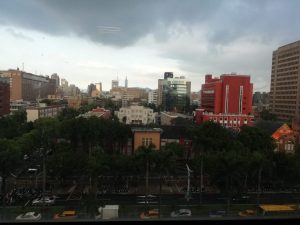
Visa application:
I was originally born in Taiwan; I moved to South Africa when I was two years old and I grew up in Kwa-Zulu Natal. Having both a Taiwan passport and South African passport, fortunately I did not need to apply for a visa; however, I am aware that South Africans need to acquire a visitor’s visa before travelling to Taiwan.
Suggestions:
Initially I struggled in terms of packing for the one month trip. Although, reflecting back on the trip, I think this is highly dependent on the season and the weather. So pack according to the weather! Taiwan, especially Taipei, is extremely humid during the summer months – so it was important to pack comfortable clothes that were at the same time ‘hospital appropriate.’ Although I was in the surgical theatre most of the time, it was unnecessary to pack my own scrubs because it was offered at the hospital. Also to reduce unnecessary baggage, don’t waste space packing items that are conveniently available and cheap there too such as shampoo, sanitizer, deodorant, facial tissues and etc. In terms of registering for a sim card, get it sorted at the airport as soon as you land. There are awesome package deals available for the amount of time you are staying there for. There is free Wi-Fi almost everywhere in Taiwan and that makes travelling and finding destinations very easy. There is also a monthly prepaid transport card that gives unlimited access to the bus system, metro system as well as the U-bikes for an entire month which is much more worth it that paying for the trips upfront each time. The transport in Taiwan is super safe and convenient and a great way to meet new people.
With regards to organising the dates of the elective, I regret not planning it better. I had 3 days before and 4 days after my elective excluding flight time; thus my time felt rushed and it was difficult to organise time aside to do things, travel and etc. Thus I would recommend organising the elective period so that free days are either mainly before or after the elective period.
Experience at Host University:
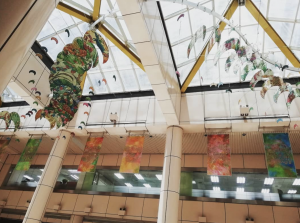
I faced many challenges throughout my four weeks abroad – from orientating myself and getting used to a new country with a different culture and people to learning to be more independent, especially when it comes to asking questions and my learning during the four weeks.
With regards to plastic and reconstructive surgery – my supervising doctor’s specialty was in the female mammary gland; and during my elective I mostly followed her; so I got to observe a lot of mastectomies, mammoplasties, breast reconstruction done post-cancer resection, blepharoplasties, as well as numerous types of flaps that were done. During my second week there, I got to scrub in and assist during the surgeries which was definitely a highlight for me. She was very helpful and informed me of the type of surgeries beforehand so I could read-up a bit before I went into theatre which helped a lot. She also guided me during the actual surgery so I was able to keep up to what was being done during the procedures. I also attended OPD clinic where I got to see patients being followed up (i.e. before and after they were operated) – this was nice because I got a sense of continuity of care and allowed me to gain a better understanding of the patients’ attitudes and perspectives.
On the second Wednesday into my two weeks in Plastic and Reconstructive surgery; it was declared that July 11(Wednesday) to be a day off due to warnings of Typhoon Maria which was initially predicted to be a super typhoon. This meant that most governmental institutions and workplaces encouraged a day off of no work or classes to brace for the typhoon for safety purposes. So the doctors told me the previous day to not come in and surgeries for the day were all cancelled. However fortunately, Typhoon Maria downgraded from a Super typhoon but still caused havoc downpour with strong winds and flooding throughout some parts of the Taiwan. I had never previously witnessed a typhoon before in my life so this experience was like no other and proved to be quite interesting.
With regards to the two weeks I spent at paediatric cardiothoracic surgery, I got to see surgeries predominately on children with congenital heart defects. My supervising doctor during this period was one of the attending physicians in cardiovascular surgery; and his specialty was in congenital cardiac surgery, emergency medicine and extra-corporeal circulation.
A definite highlight was being introduced many of the machines and techniques used in the hospital for example, ECMO (Extracorporeal Membrane Oxygenator) which I had not even been exposed to in my undergraduate studies thus far. Therefore it was interesting to observe and learn about these resources.
Another highlight was getting to see how the bypass machine worked. Because, cardiovascular surgery is not part of any of our clinical modules in our undergraduate course; I was excited to see how it worked.
I kept a notepad in which I kept some notes in throughout my elective. However, most of my elective portfolio outcomes I gained not clinically but theoretically. The hospital also had free Wi – Fi everywhere which made it extremely easy and efficient for me to quickly read up on things that I did not know.
NTU vs SU:
The four weeks I spent in National Taiwan University exposed to me how efficiently a hospital can be run. An aspect that was particularly remarkable for me was how competently each member fulfilled their role and communicated successfully within the integrated health care team; as opposed to the tendency for these multiple roles to be separated in a South African setting. For instance, nursing sisters and staff at NTUH are very competently trained. The clinical nurses do all the routine work – drawing of bloods, putting up intravenous lines, central venous lines, adjusting machines, writing up of routine medications etc. – most of which constitutes the majority of junior doctors work in South Africa. The doctors/ surgeons at NTUH just had to perform surgeries, manage complications or perform more difficult procedures. The relationship between the doctors and nursing staff is also very functional and there was good communication between them; thus this lead to better general healthcare delivery to patients and utilisation of time.
The ratio of nursing staff to patients in the ICU setting is 1:2 and 1:4 in a normal non-ICU ward. This is an unbelievable health care worker to patient ratio – and it shows how detailed and focused patient care is at a hospital like NTUH.
It was incredible to see how advanced the level of medical expertise and resources allowed for the sustainment of human life in Taiwan but for basic general health as well. Furthermore, because of the National Health Insurance Programme in Taiwan, the resources are not as limited to the disadvantaged individuals with less money; and there is no discrepancy between the level of healthcare offered in public versus private hospitals. This balances out the segregation of the level of health care between the public and private sector that we distinctly see in South Africa.
I was informed and also got to witness how a specialist doctor in Taiwan in average sees up to over a hundred patients per afternoon in the outpatient clinic. I originally did not believe that such a figure was even a reality; because in South Africa it is already bizarre for a single doctor to see 20 – 30 patients in a morning at the clinic. However, in Taiwan, they have to see three times the amount of patients that we do here in almost the same amount of time.
The doctors literally spend on average up to three minutes per patient. This is possible largely due to the incredible efficiency of how the outpatient clinics are run.
The nursing staff are also trained and do all the administrative and paperwork, including the writing up of scripts, etc, and the doctor just has to consult the patient. There is often however not enough time for the doctor to develop rapport with the patient, without the doctor-patient relationship being often consequently compromised in the process.
The outpatient clinics are run according to a number system. Patients are given numbers, much how they are in South Africa. However in Taiwan, they are also given an estimated time of their appointment. This eliminates the large crowds in waiting room that we see in South Africa clinics and the patient is also pleased as he/she does not have to sit in the clinic for hours to wait to see a doctor. There is even an online app made available to the public to see how many patients have been seen by a certain doctor thus patients can track what number patient their doctor is currently seeing, so that they can much more easily predict at what time they have to be in the hospital by – this system is efficient and prevents patients sitting for long hours outside the clinic and wasting time.
In Taiwan, specialist care is offered so casually that when a patient has some chest pain, they will go to a hospital to make an appointment to see a cardiologist, if they have a headache, and they will go to see a neurologist etc. There is no ‘filter system’ and patients do not go to see general practitioners first before heading towards a specialist.
This elective has made me realise that although Taiwan’s health system is extremely advanced and the doctors are excellent in what they do, I think they often lose out on developing a secure doctor-patient relationship which is an integral aspect that us as Stellenbosch graduates have been repeatedly taught from our first year of studies. Thus this has made me more vigilant and reflect on the importance of not allowing work pressure to get in the way or forget that every patient is a person, a human being with emotions and feelings and not just a diagnosis or pathology.
Furthermore, not ignoring the fact that Taiwan has a vast variety of cuisines available to try – from shaved-ice, bubble teas, dim sum, pan-fried buns, beef noodles, braised pork rice and hot-pot… the list is literally endless. Being a vegetarian, it was at times hard to find appropriate food but other than that I really enjoyed the atmosphere at and busy night markets and there are a variety of restaurants too.
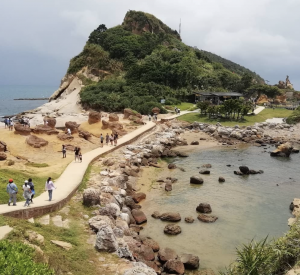
There are also many incredible historical sites, landmarks, museums and food places to travel and explore. The Taipei 101, Yehliu geopark, Chinese Imperial art at the National Palace Museum, Sun moon lake, Hualien and Taroko gorge are just a few of the fantastic places to name.
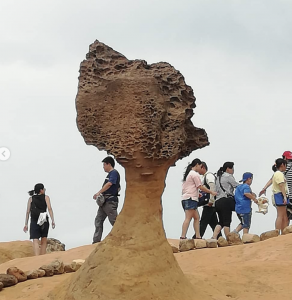
Return to Stellenbosch:
Despite that jetlag upon returning back to Stellenbosch, the realisation that my four weeks elective just flew by came crashing back and the thought of accepting that my trip was officially over was quite daunting. However, after spending a month away, I was happy to embrace Winter in South Africa again and I was equally excited to share my experience abroad with my classmates as well as to hear about their elective experiences.
The long flight back to South Africa gave me ample time to reflect on my elective abroad. And made me realise how fortunate I was to be able to study my medical degree abroad in South Africa which is undoubtedly such a beautiful country with so much space, freedom and unconventional opportunities. Abroad in Taiwan, elective and exchange programs were and are not ‘part’ of the medical curriculum and the chances that they would be sent primary health care facilities around the province and required to do patient home visits are near to nothing.
I thought that I would struggle much more with the language barrier as Taiwan is a predominantly a Mandarin-speaking country. However, I was astonished to realise how proficient most of the doctors were in English. All medical notes were also almost always written in English which made it very easy for me to follow.
Since most medical literature is in English, Taiwanese medical students study medicine in English – which is often their second or third language. A fact that made me realise just how lucky I am to be able to study medicine in predominantly my first language.
This has also made me more determined to make an effort in trying to learn to speak Afrikaans and isiXhosa better – as being able to speak your patient’s language really does open up that barrier between you and your patient.
Having always struggled to decide whether I liked medicine or surgery more, I think I understand more of what surgery requires now and I feel that it will benefit me in the sense that I will play a role in helping me direct in the future whether my interests lie in surgery or medicine.
One of my personal outcomes of this elective is that I wanted to see what medical administrative aspects worked well in Taiwan and whether some of these positive changes could possibly be implemented here in South Africa. I think that having a better planned and implemented number system for the clinics could drastically improve the dynamics of our often overcrowded clinics.
Impact of the trip:
Besides the excellent healthcare available to be learnt from, Taiwan is also beautiful and has incredibly unique culture with vibrant and busy city life as well as the serene countryside with rich landscapes to travel and explore.
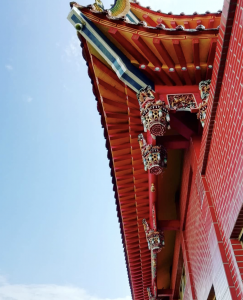
I am very grateful for this opportunity that was given to me to and allowing me to experience what it was like to do an elective abroad. Despite a difference in language and culture, it is humbling to see amidst it all ‘people’ being united through passion and work.
This past trip abroad was definitely a positive one and will undeniably influence my future plans to go abroad again. I feel that we live in a world where there is such rich exposure to culture, knowledge and experiences available; and it would be a pity to not embrace it all.
By and large, I am very thankful for my incredible experience and the lessons that I learnt during my four weeks in Taiwan and I feel everything that I gained from this elective will stay with me and play a role in shaping as a person, future doctor and how I vision and practice medicine

